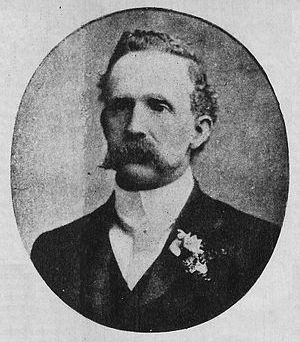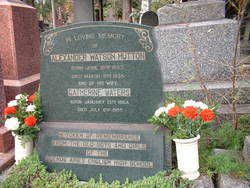Alexander Watson Hutton

Alex Watson Hutton is considered and was without doubt "The Father of Argentine Football", if something of an adoptive one. In 1893 he became the President of the Argentine Football Association, from 1898 Alumni F.C., the club founded by former pupils of his English High School, would develop into the the best team in the country and remain so for a decade and his son, Arnold, would become for seven seasons a regular Argentine international.
But, of course, the elder Watson Hutton was not an Argentine by birth. He was a Scot, born in the Gorbals in Glasgow and raised in Edinburgh.
In fact the early Watson Hutton story is both complicated and not without pathos. He was born in 1853, the son of Fifers, his father a Grocer from Dunfermline, his mother from Crossgates. But the family was to leave Glasgow with Alex aged just two, moving to Leith, which is where a series of tragedies struck. Within weeks of arrival in the capital city in 1855 Alex's father died. His younger brother then passed away aged two in 1857 and was followed by their mother in 1858. He was therefore orphaned at just five to be brought up by first his grandmother, who would die in 1862, he by then just eight, and then be awarded an orphan-place at Daniel Stewart's, it a rugby school. That is, however, before he from there trained as a teacher at Edinburgh University, so aged twenty as football took hold in Glasgow and twenty-two as it arrived in Auld Reekie.
And it as a teacher that Watson Hutton reappears in the record in 1881, boarding still in Edinburgh with a family, the Waters, where the elder sister is a Pupil Teacher and the younger one a Milliner. It was a year before at twenty-nine Alex would make the decision to take up a position in Argentina, in Buenos Aires at the St. Andrew's Scots School, where he stayed two years but not to return home. Instead in 1884 he opened still in the Argentine capital his own English High School.
The new school proved successful, allowing him, as a believer in the benefits of sport in education, to introduced football, playing in-school alongside his pupils and also outwith at a more senior level as the game gradually arrived with increasing numbers of British workers. It also allowed him to marry, his bride thirty-year old Margaret Budge, with whom he was to have three children, a son and two daughters, all Argentine-born. She was originally from Anstruther in Fife but had also been a teacher in Edinburgh before subsequently heading the lower school at the English High.
However, the occasional game was for the moment the limit of his involvement even as in 1891 the Argentine Association Football League was formed largely at the instigation of fellow Scot, Alex Lamont, with the Englishman, Frank Wooley, as President. In part that may have been because Margaret Watson Hutton may already have been unwell. She would die in August 1893 at the age of just thirty-eight. But there was also the death of Wooley in 1892, which resulted in no organised competition that year and Watson Hutton, with Lamont still doing the organising, willing or in 1893 persuaded to step into the breach and from that point, even after the departure of Lamont in 1894 and Hutton himself stepping down at President in 1895, he providing a figurehead around whom the sport could then evolve.
Alex Watson Hutton would retire from his school, which still thrives, in 1910. By then he had also in 1902 remarried, his second wife, Catherine (Kate) Waters, the milliner, younger daughter of his Edinburgh landlady of two decades earlier. And by retirement he had also rather fallen out of love with football as it was ceasing to be amateur. It would not officially professionalise in the Argentine until 1931 but in the meantime had and would become increasingly shamateur. In fact his sporting interest would turn to rugby. He would be a member, eventually President, of the Belgrano club, in fact staying just by its ground. It had been formed in 1896, been a founder member of the Argentine Rugby Union in 1899, would last win the Argentine football championship in 1908 but would be relegated in 1916 and eventually disaffiliate completely from the AFA, whilst remaining a rugby powerhouse to this day.

Alex Watson Hutton would enjoy a long and local retirement during which he, Catherine and children would travel back to Scotland on several occasions but not to stay. In fact he would not pass away until 1936, then aged eighty-two, and at home just feet from the Belgrano Club ground still and only yards from the English High. He would be survived by Kate for almost two decades. Her passing would be in 1955, she aged ninety-one at her then residence, just one more street away from her, their previous home. And both are buried in the British Cemetery, itself just a mile and half away.
Birth Locator:
1853 - 29, Eglinton St., Gorbals, Glasgow
Residence Locations:
1871 - N/A
1881 - 4, St. Patrick Square, Edinburgh
1891 - Argentina
1901 - Argentina
1902 - Married Catherine Waters
1911 - Argentina
1921 - Argentina
1936 - Superi, 1722, Buenos Aires, Belgrano, Argentina
Death Locator:
1936 - Superi, 1722, Buenos Aires, Belgrano, Argentina
Grave Locator:
Cimenterio Britanico, Chacarita, Buenos Aires, Argentina
Back to the Glasgow Southside Trail
or the SFHG Home